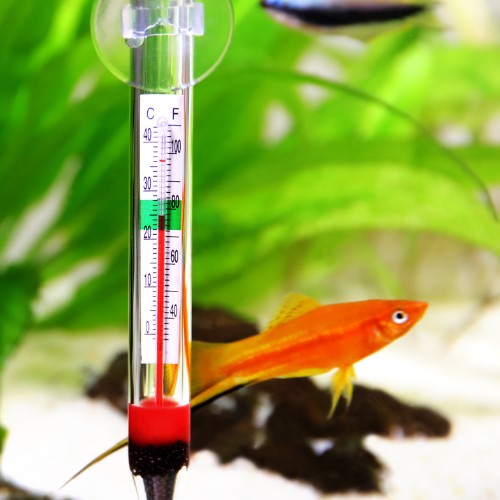
What temperature for an aquarium?
F. MattierShare
The ideal temperature for an aquarium is often debated.
"Generally, we agree on 24°C. This is for tropical species, of course."
For the Amazonian "biotopes" (Discus, cardinalis, etc.), we often go even further.

Aquarium manuals mention fairly precise temperatures for each species, and one sometimes finds themselves in a dilemma when wanting to house several together.
An inappropriate temperature is obviously a source of stress for the body.
For a fish, it is quite different from what we can imagine. In our case, the cold makes us shiver and the heat makes us sweat. But this is due to the fact that our body struggles to stay around 37°C, whether it is 0°C or 35°C outside.
For fish, it’s different. The temperature of their body varies with that of the water. They are therefore much more subjected to and sensitive to it, since their metabolism has to function at this temperature, without being able to change it. Some enzymes designed to work optimally at 20°C function less well below or above.

Unlike ours, the metabolism of fish does not require 37°C to function (far from it!). It is adapted to temperature variations, as it is subjected to them. Each species has its optimum. But this is only an optimum, not a strict requirement (unlike our 37°C).
A goldfish outdoors (where it feels best) goes from 5°C in winter (even less, slowing down at the bottom of a pond) to 25°C in summer.

But a trout will die if the water is warm, less from the heat than because warm water is too low in oxygen.
Conversely, a Discus cannot tolerate cool water and will become ill, then die, as its metabolism fails at low temperatures.
Should we conclude that, apart from goldfish, all fish live with their noses on the thermometer?
No, because experiments conducted in poubellarium have shown that, within a certain limit, temperature can appear as a relatively secondary factor.
Important, but secondary.
For example, a tropical fish, placed outdoors in summer, will choose its temperature by swimming to the surface or diving deeper. Indeed, there can be a temperature difference of 6°C between the surface and the bottom of a poubellarium in summer. However, it will not hesitate, to avoid your gaze or to chase a daphnia , to dive in a matter of seconds, thus easily enduring a significant temperature difference.

Finally, I personally picked up guppies, platys, and swordtails at the end of October in water at 11°C. They were in perfect health, with unmatched colors and an incredible vitality in the net! They would never have survived that in an aquarium.

It therefore seems that the theory of cumulative stress applies to fish as it does to other animals: a stress (within reasonable limits) is a stimulation that brings well-being or excitement, but the same stress, if accumulated with others in excess, becomes harmful, and even lethal. Beyond a certain threshold that is very difficult to assess, and probably, as with us, different for each individual.
The pleasure of a varied life in a poubellarium (natural food, rain and wind, green water, calm, etc.) largely compensates for the micro-aggression of temperature. But in an aquarium, it is added to the noises (filter, aerator, pumps), to captivity (transparent walls, view of humans…), to industrial food, to overpopulation, etc. And there, the fish's tolerance (or rather its pleasure) in the face of temperature variations becomes low, even zero. The temperature then becomes "the stress of too much."

Once again, we are faced with the issue of the pleasure of fish.
New field of research, long ignored, but clearly fascinating!
Aquaristics is finally evolving, and that's a good thing.
4 comments
Bravo Aurélie, les guppies ne sont jamais aussi heureux que dans ces conditions. Et je connais bien des appartements en ville chauffés tout l’hiver à plus de 22°C ! Pas besoin de chauffer les aquariums dans de nombreux cas.
Oui, Frédéric, c’est une excellente idée. Les réponses varieront bien sûr selon les régions (de l’Ile de La Réunion au Pas de Calais !), mais ce serait passionnant d’avoir des retours d’expérience. Sans doute plutôt des cyprinidés, mais on peut être surpris. Certains Corys, également, me semble-t-il…
Merci pour cet article
J’ai un bassin depuis plusieurs années où je fais des essais avec des poissons qui restent à l’année et j’aimerai avoir d’autres retours d’expérience s’il y en a parmis les lecteurs !
Sujet très intéressant merci d’en avoir fait un article ! Et en effet grand dilemme pour tout ceux qui souhaitent bien faire… De mon côté aquarium presque low tech (ajout d’un buller) et une eau à 21/22, degré toute l’année, mes guppys se portent à merveille !